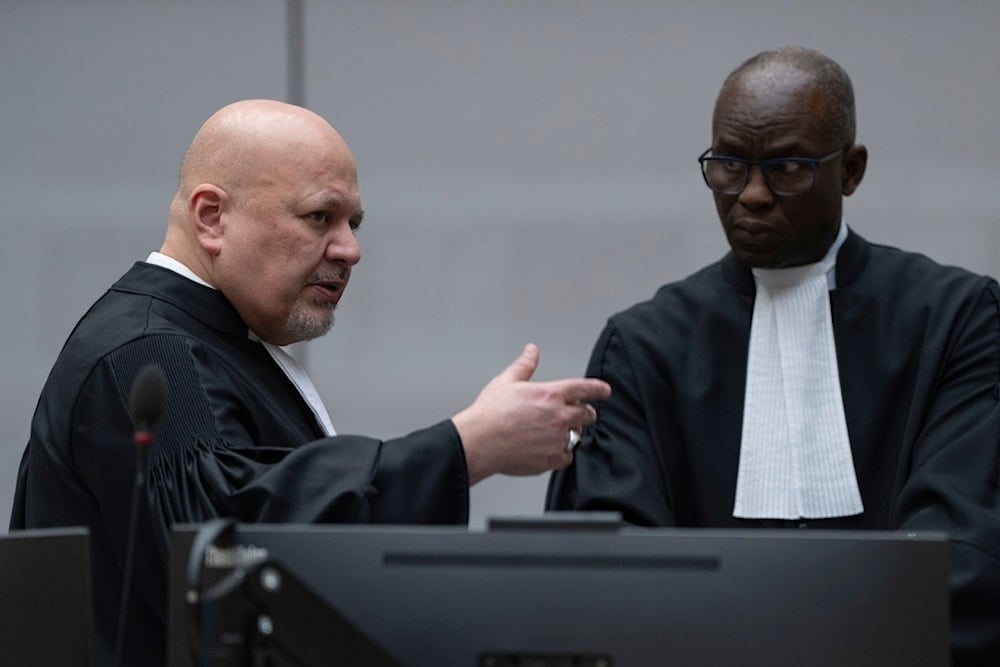Trump admin sanctions ICC judges, prosecutors over 'Israel' case
The Trump administration sanctions four ICC officials over cases involving the Israeli regime and the US, sparking ICC condemnation of an attack on judicial independence.
-

Chief Prosecutor Karim Khan, left, talks to Deputy Prosecutor Mame Mandiaye Niang at the International Criminal Court (ICC) in The Hague, Netherlands, Friday, March 14, 2025. (AP)
The administration of US President Donald Trump has imposed sanctions on four officials of the International Criminal Court (ICC), escalating Washington’s confrontation with the war tribunal over cases involving the United States and the Israeli regime.
In a statement on Wednesday, Secretary of State Marco Rubio described the ICC as “a national security threat” and “an instrument for lawfare” against the US and its allies. The sanctions target judges Nicolas Yann Guillou of France and Kimberly Prost of Canada, along with deputy prosecutors Nazhat Shameem Khan of Fiji and Mame Mandiaye Niang of Senegal. All have been involved in cases linked to the Israeli regime and the US.
“The United States has been clear and steadfast in our opposition to the ICC’s politicization, abuse of power, disregard for our sovereignty, and illegitimate judicial overreach,” Rubio said.
Escalation of a long-running dispute
The sanctions freeze any US assets held by the four officials and cut them off from the American financial system. The move comes less than three months after Washington sanctioned four other ICC judges, marking the second round of punitive measures against the court this year.
The ICC issued arrest warrants last November for Israeli Prime Minister Benjamin Netanyahu, former Security Minister Yoav Gallant, and Hamas leader Ibrahim al-Masri (Mohammad Deif) for alleged war crimes and crimes against humanity in Gaza. Guillou presided over the pre-trial panel that authorized the warrant for Netanyahu, while Khan and Niang currently serve as the court’s two deputy prosecutors.
Prost, a Canadian judge, sat on an ICC appeals chamber that in 2020 authorized the investigation of alleged war crimes in Afghanistan, including possible crimes committed by US troops.
Sanctions on ICC judges
Rubio announced the measures back in June, which barred the judges from entering the US and freeze any assets under US jurisdiction, sanctions typically used against US adversaries, not jurists.
Rubio defended the decision by vowing to “protect our sovereignty, that of Israel, and any other US ally from illegitimate actions by the ICC.” The remarks signal an escalation in Washington’s campaign to shield Israeli leaders from accountability for crimes committed during their ongoing assault on Gaza.
Netanyahu praised the decision, thanking President Donald Trump and Rubio for "standing up for the right of Israel," despite growing international consensus that "Israel’s" conduct in Gaza may amount to war crimes and crimes against humanity.
Read more: ICC judges issue gag order on arrest warrants in Israeli war crimes
Although neither the United States nor "Israel" are parties to the Rome Statute, the ICC has jurisdiction over crimes committed in Palestine, a State Party since 2015. The court also holds jurisdiction over any crimes committed on the territory of member states or by their nationals.
ICC condemns sanctions as attack on judicial independence
In a strongly worded statement, the ICC denounced the measures as “a flagrant attack against the independence of an impartial judicial institution and an affront to the rules-based international order, and to millions of innocent victims worldwide.”
The court added that it “will continue fulfilling its mandate in strict accordance with its legal framework, without regard to any pressure or threat.”
The Trump administration has long opposed the ICC. In 2020, Washington sanctioned then-prosecutor Fatou Bensouda and one of her aides over investigations into Afghanistan.
What is the ICC?
Founded in 2002, the ICC prosecutes genocide, crimes against humanity, and war crimes within its 125 member states or in cases referred by the UN Security Council. The US, China, Russia, and "Israel" do not recognize the court’s jurisdiction.
The ICC is currently handling high-profile cases, including the Russia–Ukraine war, the "Israel"-Gaza conflict, and situations in Sudan, Myanmar, the Philippines, and Venezuela.
Observers warn that Washington’s latest sanctions could hinder the court’s ability to operate at a critical time, undermining its independence and its capacity to pursue accountability in global conflict zones.

 4 Min Read
4 Min Read








